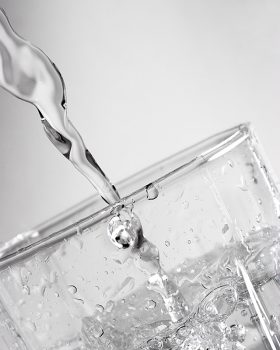De kaj Da – How do you say “a glass of water” in Esperanto? Posted by Tomaso on Nov 27, 2017 in Esperanto Language
How do you say “a glass of water” in Esperanto?
In last month’s blog post we talked about prepositions – how to use them in general. This time we’re going to take a closer look at two specific prepositions that are often confused. These are de and da. If you’re having problems with these two words, don’t feel bad. The authors of the e-mail course (used in Lernu kun Logano) didn’t get it quite right, and when a previous blogger took a crack at it, a few readers commented with questions and corrections, and I said I would come back to the topic in a new post. Here we are.
What are you thinking “of”?
Both de and da can be translated “of”, but they are used differently.
De shows attachment or belonging.
- La ideo de Karlo – Karlo’s idea
- La pinto de la monto – the peak of the mountain
- La prezo de pano – the price of bread
- Li venas de Hispanujo – He comes from Spain (he’s Spanish.)
De is often translated “from”, but don’t confuse this with el.
- Mi venas el Hispanujo – I am on my way from Spain.
De can also be used to show who did something.
- Ronkado de Avo – Grandpa’s snoring
- Libro legata de Panjo – a book read by Mom.
It’s all about the quantities, baby.
Da is the preposition to use with quantities. It’s used with kiom (how much / how many) and answers to kiom. Sometimes it’s translated “of”, but often it’s not translated at all.
- Kiom da butero? How much butter?
- Litro da lakto – A liter of milk
- Kilogramo da sukero – A kilogram of sugar
“Quantity” here doesn’t need to be a standard unit of measure. It can be anything that answers (or asks) the question “how much”. To return to the question in the title, “how much” can also be “a glass.”
- Glaso da akvo – A glass of water
- Iom da doloro – Some pain
- Multe da lernado – A lot of learning
- Tri tagoj da lernado – three days of learning (three days’ worth)
- Granda nombro da lernantoj – a big number of learners
If it looks like a quantity and quacks like something else…
Note that with these last two examples, we only use da if the expression we’re using could be an answer to kiom. How much learning? Three days worth. How many learners? A big number of them. If it can’t be an answer to kiom, then you should use de.
- Tri tagoj de lernado – Three learning days. Three days of learning.
- La nombro de lernantoj estis granda. The number of learners was big.
In these last two examples, de is used to tell us what kind of days they are and what kind of number it is.
It’s the definite article / Don’t use da with la.
Another important detail is that da can only be used when the thing measured is indefinite. Simply put, don’t use da with la. This also applies to words that work similar to la like tiu or mia.
- iom da akvo – some water
- iom de tiu pli pura akvo – some of that cleaner water
- amaso da amikoj – a ton of friends
- amaso de miaj amikoj – a ton of my friends
- iom da vino – some wine
- iom de ilia vino – some of their wine
One way to look at this is that if you’ve specified which water, or milk, or friends you’re talking about, you need to say that you’re selecting some “from” that group. In fact, Esperanto works this way because of Slavic influence. Notice, however, that English does something similar with the examples using “some”. The way we join the quantity word to the thing measured changes if we use “the” or “my.” (In English this only works with “some” and “how much”, but I mention it to point out that a lot of languages do this sort of thing.)
- Some pickles.
- Some fancy pickles.
- Some of the fancy pickles.
- Some of your pickles.
and
- How much water?
- How much of the cleaner water?
Comment and come back next month.
What do you think? Are there any other prepositions which give you grief?

Build vocabulary, practice pronunciation, and more with Transparent Language Online. Available anytime, anywhere, on any device.





Comments:
David:
This is helpful, dankon!
Tomaso:
@David Nedankinde. Bonan lernadon!
Tomaso:
A reader asked why “Tri tagoj de lernado” can’t be “Tri tagoj da lernado.” My point was that it can be either, depending on what you mean.
If the context is that every month you set aside three days just for learning, you could say “Hodiaŭ, morgaŭ kaj postmorgaŭ estas miaj tri tagoj de lernado.” These are your three learning days. What kind of days are they? Days of learning. Was yesterday one of your learning days? No. I can’t have lunch with you tomorrow because I’ve set it aside as a day of learning. We’re focused here on what kind of day it is, not how much learning.
If the context is that while you were on vacation, you had three days where you did nothing to learn, you could say that you had three days (worth) of learning. If your point is to talk about *how much* learning you’ve had, then use *da*.
Garsia:
Dankon. Bonega klarigo.